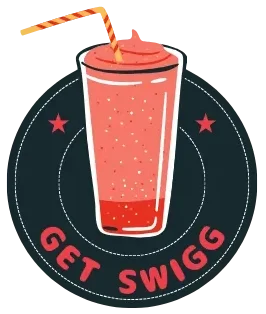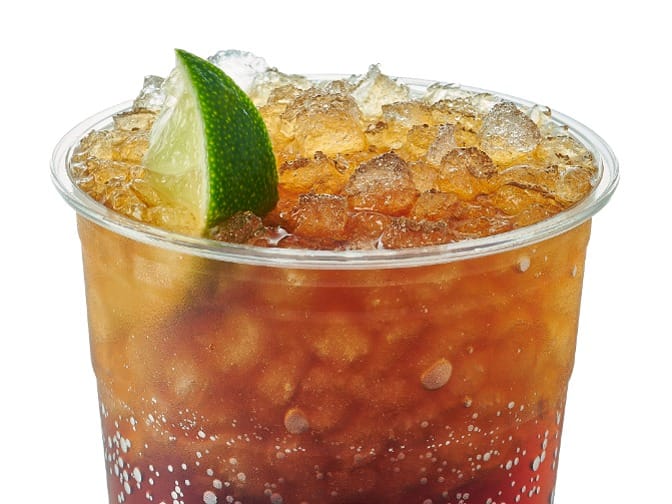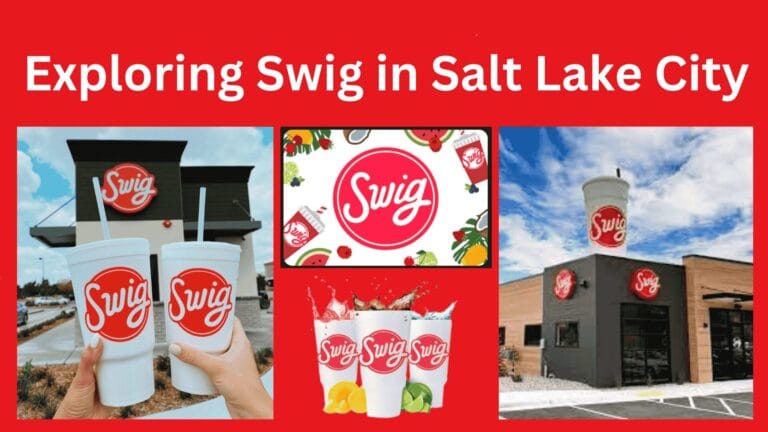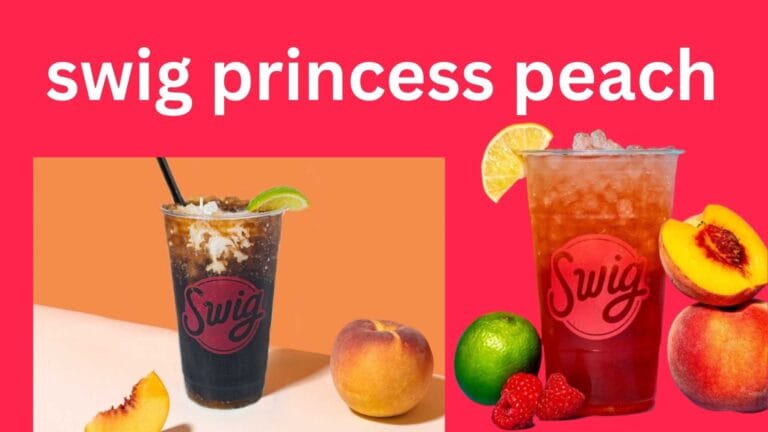Swig Soft Drinks| the Sweet About Their Sugar Content 2025

Soft drinks are the most favorite all time beverage of all human beings of this world, providing an easy way to quench the thirst with a refreshing taste. Among them, Swig soft drinks have been a favorite. whether it is a hot day having a glass of cola or a fizzy soda with your meal. Nevertheless, their sugar level is too high and the case goes to Swig soft drinks.
Consuming too much sugar in beverages is a serious health issue. Obesity and diabetes can result from these drinks. Thus, it would be helpful to be aware of these issues before consuming Swig soft drinks. One needs to think more about the healthier options or consume them in smaller quantities to prevent harming one’s health.
check out the swig menu to complete the information swig menuThe Ingredients of Swig Soft Drinks
Drinking a can of Swig soft drinks is drinking a mix of ingredients that create a specific flavor. However, looking at the ingredients makes one thing clear: all Swig sodas are sugar loaded. The soda tastes sweet because sugar is usually the first ingredient listed. At times, it’s even hard to resist the taste. Among the most influential factors involved in the taste and, therefore, the appeal of a soda from the Swig line are the high sugar contents.
The Role of Sugar in Soft Drinks
Soft drink companies such as Swig add a lot of sugar to their drinks for several reasons. Sugar makes the drink taste sweet, and many people like that. It also helps keep the drink fresh, so it lasts longer in stores. Also, sugar is important for making soft drinks fizzy.
This is the primary reason why drinks feel fizzy. All these qualities combine to make the drink better and more appealing, hence increasing how satisfied customers are when they buy Swig soft drinks.
Everything you need to know about Swig Salt Lake CityHealth Implications
Several health problems are caused by consuming too much sugar in soft drinks such as Swig soft drinks. Consuming too much sugar results in weight gain since the calorie content is high and sums up very fast. It further leads to decay of teeth and causes dental problems.
This leaves them prone to chronic diseases, such as diabetes and heart disease, due to the habitual consumption of these high-calorie sweet drinks. The drinks contain “empty” calories-the nutrient-poor food-and risk nutritional deficiencies and inadequate nutrition.
To summarize.
- Weight Gain: The amount of sugar translates to too many calories, and one is sure to gain weight.
- Tooth Decay: Repeated consumption leads to tooth decay.
- Chronic Diseases: They increase the chances of developing diabetes and heart diseases.
- Nutrient Deficiency: Sugary beverages contain virtually no nutrients that would cause a nutrient imbalance.
Marketing Strategies
Soft drink companies, such as Swig, use a lot of sugar to make their drinks taste better and last longer. Sugar is used to sweeten the drink, to maintain freshness, and to support carbonation, which is the fizz that makes the drinks more enjoyable. These features improve how the drink feels and help it stand out in a crowded market.
Marketing also adds much to the popularity of soft drinks. They do advertisement and celebrity endorsement that makes lots of connections emotionally with the consumers. Tying up their brands with fun and happiness, they are beckoning people to buy their products, thereby overlooking the health drawbacks. This one tastes good, preserves well, and the marketing is excellent with which consumers tend to buy them despite health disadvantages.
Marketing Strategies for Soft Drinks:
- Catchy Ads: They make memorable ads that capture attention and help their product be noticed in the market.
- Celebrity Endorsements: They use popular people to endorse their drinks. This will attract fans to their brand and make the brand look better.
- Emotional Appeal: Most of the ads connect to fun, excitement, and happiness to reach the customers’ emotions.
- Brand Association: They associate the brands with positive lifestyles and experiences to make the drink more appealing.
- Promotion and Sponsorship: They are event supporters. They create promotions and special offers so that people buy the drink more often.
- Targeted marketing: They produce ads for selected groups so as to reach those customers they want efficiently.
Find out why people love Swig Sodas and SnacksRegulatory Measures
Various regulations have been enacted by governments on how to handle health issues attributed to excessive sugar in soft drinks. Among them are taxes on sugar, warning labels, and restrictions on advertisements to children. All of these are in a bid to reduce sugar consumption and the consequent health risks.
Despite some short-term success in reducing sugar intake, such efforts often face opposition from industry lobbyists and undermine enforcement. This debate therefore highlights the difficulty of reconciling public health goals with commercial interests in the beverage industry.
Alternatives to High-Sugar Soft Drinks
There are many healthy alternatives for people who need to drastically reduce their intake of sugar but not compromise flavor. Infused water, herbal teas, natural fruit juices, and carbonated water come as refreshing options without high sugar levels.
This again is another avenue through which customizing is easy. One will easily come up with flavorful drinks, such as those prepared using fresh fruits, herbs, or spices, minus sugar.
Alternatives help reduce the usage of sugar with palatable drinks.
The Future of Soft Drink Consumption
As people become more alert to the health dangers of sugar drinks, the future of soft drink consumption is bound to undergo change. The trend has increasingly been to opt for healthy options; there is an increased demand for manufacturers to be clearer about their ingredients.
The soft drink industry is responding to these needs through new products and the ways people buy drinks. This change exemplifies a shift toward healthier options and greater transparency in the market of drinks.
Plan your event with Swig’s catering menuNutritional
The soft drinks at Swig are amazing in their ability to create many different flavors, not to mention decadent combinations. There is just one thing: they are very calorie-dense and sugar-laden.
Calories and Sugar
Dirty sodas are drinks that mix soda with flavored syrups and cream, so a Dirty Dr. Pepper with a medium size of 32 ounces may have more than 400 calories and over 90 grams of sugar.
Revivers: Swig’s energy drinks with sodas and flavors are all high in sugar and caffeine. One standard Red Bull (8.4 oz) has 110 calories and 27 g of sugar, and the soda and flavorings will greatly increase sugar and calorie content.
HEALTHIER ALTERNATIVES
For less calorie and less sugar: Swig’s alternatives are.
Unsweetened Iced Teas A refreshing choice with the fewest calories and no added sugars.
Sugar-Free Energy Drinks: These provide an energy boost without the added sugar.
Additionally, customizing your drink by requesting “light” versions can reduce the amount of syrup used, thereby cutting the calorie and sugar content.
Considerations:
While Swig’s drinks may be a lovely treat, I’d say take it in moderation, since there is such high sugar and caloric content involved. Being in the know helps make good decisions towards one’s dietary goals.
Ingredients
Here is a table summarizing the ingredients in Swig’s Soft Drinks.
| Soft Drink | Ingredients |
|---|
| Dirty Dr. Pepper | Dr. Pepper, coconut syrup, half & half or cream |
| Raspberry Dream | Sprite, raspberry puree, coconut cream |
| The Founder | Diet Coke, coconut syrup, fresh lime |
| Missionary | Sprite, coconut syrup, fresh lime |
| Sugared Up | Mountain Dew, mango puree, vanilla cream |
| The Swig | Coke, coconut syrup, vanilla cream |
| Coconut Breeze | Sprite, coconut syrup, fresh lime |
| Berry Blast | Sprite, blueberry syrup, coconut cream |
| Cherry Limeade | Sprite, cherry syrup, fresh lime |
| Pineapple Paradise | Mountain Dew, pineapple syrup, vanilla cream |
| Peachy Keen | Sprite, peach syrup, coconut cream |
| Citrus Splash | Sprite, lime syrup, fresh lime |
Why people love the item
- Unique Customization:
Swig’s soft drinks are highly customizable, allowing customers to mix and match sodas, flavored syrups, creams, and fruits to create a drink that’s uniquely their own. This level of personalization is a major draw!
- Signature Combinations:
Swig’s signature drinks are the “Dirty Dr. Pepper,” “Raspberry Dream”, and “The Founder”, to name a few. These combinations are fun, flavorful, and unique to Swig, which makes them easy to choose from. - Sweet & Refreshing:
The drinks at Swig are very sweet and refreshing due to syrup additions and smooth creams. This is the best treat for anyone who wants something sweet and cold. - Indulgent but Accessible:
The drinks at Swig are indulgent with rich syrups and creams, yet affordable. It is very easy to have fun and treat yourself to something special without going broke. - Fun and Instagram-Worthy:
The colorful nature of Swig drinks makes them very shareable on social media. The appearance of the drinks, especially with cream and extra toppings, creates an exciting visual appeal that people love to capture. - Caffeine Boost:
Swig offers drinks with caffeine (like their Dirty Diet Coke) for those who need a pick-me-up and still want something indulgent. - Nostalgic Soda Shop Feel:
Swig offers an old-school soda shop feel, with customers being able to reminisce over the past experience while sipping on a modern take of something traditional. Such nostalgia enhances the experience. - Seasonal and Limited-Edition Flavors:
Swig makes things fresh by using seasonal and limited-edition flavors, which entices a second visit to try out the latest concoction. - Handy Drive-Thru:
Swig provides a drive-thru that one can grab for a quick drink without having to leave the car, which easily makes it a treat for an on-the-go busy customer. - Group Experience:
Friends often enjoy their fun drink combos together. Thus, going to Swig in groups, trying different combos, and sharing is common.
How to make (item) at home
Here is a table summarizing how to make Swig-style soft drinks at home.
| Item | Ingredients | Instructions |
|---|
| Dirty Dr. Pepper | 1 can of Dr. Pepper 1–2 tbsp coconut syrup 1 tbsp half & half (or coconut cream) Ice | 1. Fill a large cup with ice. 2. Pour in Dr. Pepper. 3. Add coconut syrup and stir. 4. Top with half & half or coconut cream. 5. Stir and enjoy |
| Raspberry Dream | 1 can of Sprite 1–2 tbsp raspberry puree or syrup 1 tbsp coconut cream Ice | 1. Fill a large cup with ice. 2. Pour in Sprite. 3. Add raspberry puree and stir. 4. Top with coconut cream and stir again. 5. Enjoy |
| The Founder | 1 can of Diet Coke 1–2 tbsp coconut syrup 1 lime (sliced) Ice | 1. Fill a large cup with ice. 2. Pour in Diet Coke. 3. Add coconut syrup and stir. 4. Squeeze lime into the drink and drop it in. 5. Stir and enjoy |
| Missionary | 1 can of Sprite 1–2 tbsp coconut syrup 1 lime (sliced) Ice | 1. Fill a large cup with ice. 2. Pour in Sprite. 3. Add coconut syrup and stir. 4. Squeeze lime into the drink and drop it in. 5. Stir and enjoy |
| Sugared Up | 1 can of Mountain Dew 1–2 tbsp mango puree or syrup 1 tbsp vanilla cream Ice | 1. Fill a large cup with ice. 2. Pour in Mountain Dew. 3. Add mango puree and stir. 4. Top with vanilla cream and stir again. 5. Enjoy |
| Customize Your Own | Any soda (Coke, Sprite, Mountain Dew, Diet Coke) Flavored syrups (vanilla, coconut, raspberry, etc.) Half & half or coconut cream Ice | 1. Choose your soda. 2. Add your favorite syrup(s). 3. Add cream for a rich texture. 4. Stir and add fruit if desired. 5. Enjoy |
Conclusion
Swig soft drinks are similar to most other sodas, containing a large amount of sugar for sweetness, freshness, and foaming. However, this high sugar will lead to health issues, such as obesity, tooth decay, and even chronic diseases such as diabetes and heart disease. Despite these dangers, the delicious flavor and good marketing make it popular amongst many people.






